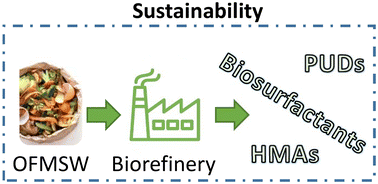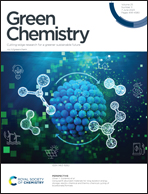Techno-economic evaluation and life cycle assessment for sustainable alternative biorefinery concepts using the organic fraction of municipal solid waste†
Abstract
Process design, techno-economic assessment and life cycle assessment have been employed for the evaluation of four biorefinery concepts using the organic fraction of municipal solid waste (OFMSW) for the production of biosurfactants together with lactic acid (LA), succinic acid (SA), hot melt adhesives (HMAs) or polyurethane urea dispersions (PUDs). LA and SA produced via fermentation using sugar-rich OFMSW enzymatic hydrolysates, while biosurfactants are produced from OFMSW-derived lipids and proteins and bacterial biomass remaining at the end of fermentation. OFMSW-derived SA replaces fossil-based SA and adipic acid in PUDs production. Process design was employed for equipment sizing and costing and the estimation of material and energy balances using experimental results obtained during the H2020 funded PERCAL project. HMAs and PUDs production could be profitable when biosurfactants are produced as co-product in OFMSW-based biorefineries, leading to minimum selling prices (MSP) of $2.92 per kgHMAs and $1.95 per kgPUDs when biosurfactants market price of $4.1 per kg, OFMSW management fees of $0.035 per kg and production capacities of SA and LA at economies of scale are considered. If LA or SA are considered as final products together with biosurfactants, then the corresponding MSPs are $1.58 per kgLA and $2.14 per kgSA. Five environmental indicators were estimated considering either conventional electricity production mix (grid) or renewable electricity usage from photovoltaics. The proposed biorefineries lead to 25–35% greenhouse gas emmission savings per kg main product (or 0.95–2.06 kg CO2-eq per kg dry OFMSW) when compared to conventional production of end-products and two OFMSW management practices based on either landfilling alone or combined composting (37.45%) and landfilling (62.55%). The results demonstrate that OFMSW-based biorefineries could lead to profitable and sustainable production of bio-based products and OFMSW utilisation as feedstock.



 Please wait while we load your content...
Please wait while we load your content...